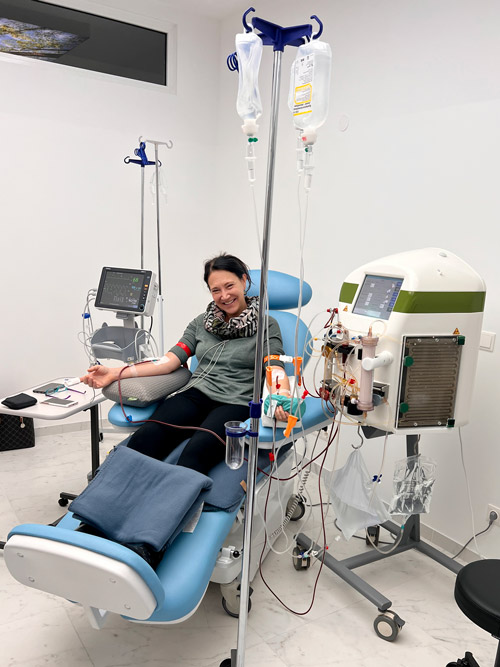At the Lissi Med Medical and Wound Centre, we specialize in the treatment of Long Covid diseases using INUSpheresis® (also known as environmental apheresis®).
Our many years of experience and expertise in the field of apheresis therapy have enabled us to develop innovative approaches for dealing with the long-term consequences of Covid-19.
Through a holistic approach to treatment and the targeted removal of pro-inflammatory factors from the blood, we have made significant progress in improving the quality of life of our patients.

An increasing number of people are affected by Long COVID, a chronic disease which, according to the latest research findings, is apparently often linked to environmental medical factors.
With Long Covid, the cells are sometimes simply no longer able to resume “normal operation” after the illness they have suffered.
The symptoms of “Long Covid disease” can vary greatly:
Neurological and cardiological symptoms are among the most common consequences of a Covid-19 infection.
Chronic fatigue syndrome, which doctors call “fatigue”, is particularly prominent.
However, other neurological disorders such as impaired sense of smell and taste, restlessness of the legs, loss of sensation and poor concentration also play a significant role.
Brain fog, speech disorders and short-term amnesia (complete or partial inability to remember events that took place a short time before) also occur.
However, cardiac arrhythmias, caused by inflammation of the inner walls of the arteries, also occur more frequently.
This can also lead to inflammation of the heart muscle.
Acute Covid disease is characterized by an inflammatory disorder of the so-called ACE2 receptors responsible for fluid balance in blood vessels and lymphatic vessels and the acetylcholine receptors, but also adrenergic receptors, which are important control elements of nerve cells and blood vessels.
Severe inflammation of the inner walls of blood vessels is typical of corona infections.
The corona virus has been repeatedly detected in the vessel walls.
It is also transported into the interior of the cells via proteins in the inner vessel wall.
This particularly affects the coronary arteries as well as the tiny blood vessels that supply the heart nerves.
According to current research, the cause is chronic vascular inflammation that disrupts the immune and coagulation system.
Vascular control, blood cell production and the nervous system are affected.
Chronic diseases that were already known before the Covid event can also become more pronounced with long Covid.
As studies by the University of Aachen have shown, herpes viruses that are permanently latent in the nervous system are reactivated in severe Covid infections and influence the course of the disease.
There is also evidence that chronic inflammation and occlusion of small blood vessels, activation of the Epstein-Barr virus and autoimmune processes are involved in the development of long-term health consequences.
Environmental factors, such as toxic metal ions or chemical industrial toxins, could exacerbate the symptoms just as much as an inappropriate diet.
According to a study by the University of Odense with 323 corona patients, perfluorinated and polyfluorinated alkyl compounds (PFAS) contained in cosmetics, ointments, shampoos and food packaging can exacerbate a corona infection and increase the risk of long Covid.
The results of blood washing procedures (apheresis) for Long Covid have so far been very promising without having been published in a peer-reviewed publication.
The processes that occur in arteriosclerosis and have been successfully combated with apheresis procedures for years have the same mechanisms in key aspects as in Covid-19 infections, namely inflammation of the inner walls of the blood vessels, increased blood clot formation and toxic components in the blood.
Laboratory analyses for post-Covid patients
In addition to a detailed medical history and clarification of other causes of illness, we carry out targeted laboratory analyses on patients with a condition following Covid infections.
Apheresis removes triggering coagulation factors and inflammatory mediators, which we have determined by laboratory chemistry before and after apheresis:
We always follow our D – T – A concept. Before we draw up a treatment plan together with our patients, it is important to make a diagnosis in advance based on the patient’s medical history. After approx. 7 to 10 days, the laboratory results provide a picture on which the treatment plan can be based.
As a rule, two INUSpheresis® treatments are initially carried out within 72 hours. After the 2nd INUSpheresis®, therapy is continued with further infusions or molecular medication as required. The determination of the genetic degree of inflammation, which is measured in the “genetic cytokine polymorphism”, is also useful in this context. Patients with a genetically increased degree of inflammation generally require more apheresis for successful treatment than patients with a genetically low degree of inflammation. Due to the outstanding importance of the pro-inflammatory key cytokines TNF-α and IL-1 as well as their counterpart IL-1RN for the individual inflammatory tendency, it has become established to grade the inflammatory tendency based on the respective genetic constellations of a patient.
Patients with an inflammation grade of 0 and 1 are referred to as low-responders, as they have a normal inflammatory capacity. In grade 3 and 4 patients, so-called high-responders, on the other hand, there is a genetically determined strong increase in inflammation. Studies have shown the importance of the IL-1 or TNF-α genotype in a number of systemic inflammatory diseases, such as diabetes, multiple sclerosis, chronic bronchitis, asthma, chronic inflammatory bowel disease, periostitis, osteomyelitis or osteoporosis.
Our aim is to restore the function and communication of your cells and your immune system to a normal state.
Follow us on social media to be informed about current service news!